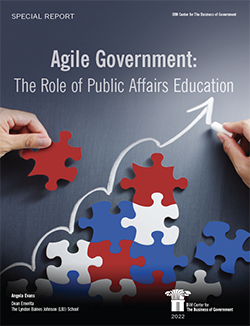
Adding Agility as a Core Element of Public Affairs Education

The National Academy of Public Administration (NAPA) established the Agile Government Center (AGC) in November 2019. The Center serves as the hub of a network that brings together governments, nonprofits, foundations, academic institutions, and private sector partners to develop and disseminate agile government principles. The network also aims to develop and support strategies to provide public goods and services that fully meet customer needs and build public trust. The IBM Center is a partner of NAPA’s Agile Government Center.
The AGC and its community of interested leaders, the Agile Government Network, are building upon the Academy’s initial efforts as presented in two reports: Building an Agile Federal Government: A Call to Action and the Road to Agile Government. The network is committed to advancing the value and practice of agility in public governance through research, global engagement, and academic program content.
A new report from the IBM Center by Angela Evans discusses how schools of public affairs (defined here broadly, to include schools of public management, policy, administration, and service as well) have an important role in public sector governance. Public Affairs schools create education and training programming to ensure the public sector has a rich and well-prepared pool of talent who can tackle lingering and emerging issues. This report presents a vision for schools of public affairs to ensure their relevancy in growing a successful public sector, drawing content from the tenets of agile government.
The curriculum and pedagogy of schools of public affairs are central in this quest. Dean Evans’ report is intended to initiate a dialog on how to integrate agile governance principles into curricula. We hope that this report spurs further collaboration among government agencies, outside entities devoted to public management, and schools of public affairs that increases the current availability and future flow of public servants who embrace the principles of agile government, and who also demonstrate the skills and capacities to act on these principles in their day-to-day work.



